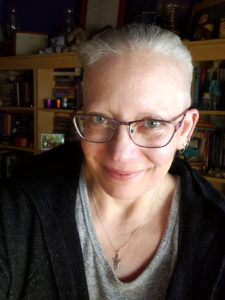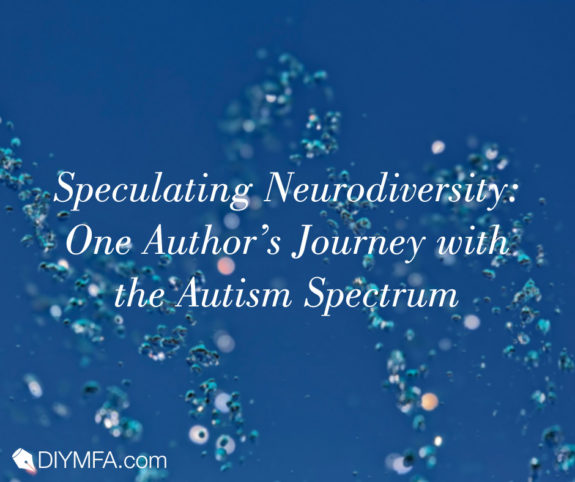Greetings, speculators!
I imagine you wondering whether this is a science fictional article, or a fantastic one. It’s both. And yet it’s neither. I’ll explain more, shortly. I’m heading in a more personal direction this time.
The past 18 months have been challenging for all of us. Pandemic life is not kind, to say the least, but challenges often come with gifts, if you can persevere long enough to overcome the one and receive the other. One of my challenges was mental health. The gift was learning that I am on the autism spectrum.
So, this Speculations is going to be partly on the science side—the social sciences, anyway—and partly about how my journey to diagnosis has affected me as a writer and creative in general. Both and neither. See?
Before I proceed, a disclaimer: I can only speak for myself and my experience. Autism is not a monolith. It’s in the name: autism spectrum disorder. No two autistic people are the same.
A Niggling Suspicion about the Autism Spectrum
A few years ago, I was listening to Canadian Broadcast Corporation (CBC) radio in the car. A middle-aged woman who’d recently been diagnosed as being on the autism spectrum was talking about her experience. I can’t remember specifically what she said, but I remember my reaction: “Am I on the autism spectrum, too?”
I wouldn’t follow up on my suspicions until February 2021.
Into the Past
I was a shy child. But I could also be giggly and hyperactive. I didn’t make friends easily. While I felt the impact of life events intensely, I often failed to read the emotional cues of other children. Sarcasm went over my head. I often said inappropriate things. I never knew how to react.
I did well in school, often finishing my homework before I left class. In those days, I read books in a matter of days. Sometimes hours.
In my teens, I learned that people thought I was a snob. I was so occupied with observation, with trying to decode other people’s behaviour—so I could have a clue about how to behave myself—that I came off as aloof and superior.
I continued to have difficulties navigating interpersonal relationships into adulthood. My early relationships were serious from the first, but inevitably imploded after a couple of years. Moving away from home to attend university was more of a culture shock for me than many of my peers.
Even after meeting and marrying my spouse, getting a full-time job, a mortgage, and a car, I continued to struggle. Eventually I was diagnosed with depression, prescribed medication, and a course of talk therapy.
Back to the Pandemic
You thought I was going to say future, didn’t you?
In December 2020, I was successful in an internal assessment process and started my dream job as an instructional designer. I also finished the latest draft of a science fiction novel and submitted it to my critique group.
In January 2021, the critiques began to roll in. No one could relate to my character. I couldn’t seem to get the emotions on the page. At the same time, I was struggling to get up to speed in my new job. Impostor syndrome on every side, I began to have panic attacks.
Out of curiosity, I filled out an online screening tool from Autism Canada. The results indicated that I was likely on the spectrum.
I am privileged to have a good employer with excellent benefits and an Employee Assistance Program (EAP). I reached out for counselling after consulting my doctor. I expressed my niggling suspicion to my counsellor: Am I on the autism spectrum? Could this be the reason for my difficulties in my career and creative life? My disposition toward depression and anxiety?
My counsellor made a referral to a psychotherapist who specialized in diagnosing adults and children on the autism spectrum. After an interview, during which the process was explained and the cost detailed, I committed to the assessment process. I had to know.
Over the course of April and May, I was assessed. The conclusion? Yes. I am on the autism spectrum. High functioning, non-severe symptoms. If it was still a distinct diagnosis, I’d be Asperger’s, or an aspie.
The diagnosis was a relief. It explained so much, not the least of which was why I was always so exhausted. In the past, I’d investigated other possibilities, like anaemia and sleep apnea, with my doctor. Diagnosis revealed to me that it’s a side-effect of trying to function in a neurotypical world.
Because of my high intelligence (this is not a brag—an intelligence test was part of the assessment, and I scored very high in two of five categories, above average in two others, and average in the last), I have developed coping and masking strategies that allowed me to excel in school and at work.
Life on the Autism Spectrum
Here I am, a 51-year-old woman, finally given the key to my life’s struggles. Though the door is unlocked and I’ve entered the room, there is so much to sift through that it will be years before I understand it all.
I’ve gained perspective though. I’ve taken a number of courses to help me improve my ability to get emotions on the page. I’m back to revisions on my novel, but it’s going slow. I’m learning to listen to my instinct. I’m a good writer. I have the publications to prove it. I’m good at my job. I wouldn’t have a 20-year career otherwise. I’m not less than. I’m just different. Sometimes it’s hard to remember that.
I’ve recently experienced my first episode of autistic burnout, post-diagnosis. I didn’t know what was happening to me until the worst was past. Essentially, overwhelm causes executive function to shut down. Decisions seem impossible. It’s hard to think. It’s hard to articulate anything. The only cure is rest and doing activities that bring you joy. Dog cuddles and writing are high on my list.
I’m reaching out to the EAP again in the hope that they’ll help me identify the warning signs and prevent another episode from happening in the future. I’ve made some small changes that have had big results in terms of fending off overwhelm.
This is not the end of my journey. It’s a work in progress. Just like me.
Thank you for joining me for this very personal Speculations.
And, until next time, keep speculating and see where it leads you!

Melanie is an instructional designer by day, SF&F author-in-progress and ink alchemist by night. She is the third generation of Marttilas to live in her little house on the street that bears her family name. She blogs at https://www.melaniemarttila.ca and you can find her on Facebook and Twitter.







